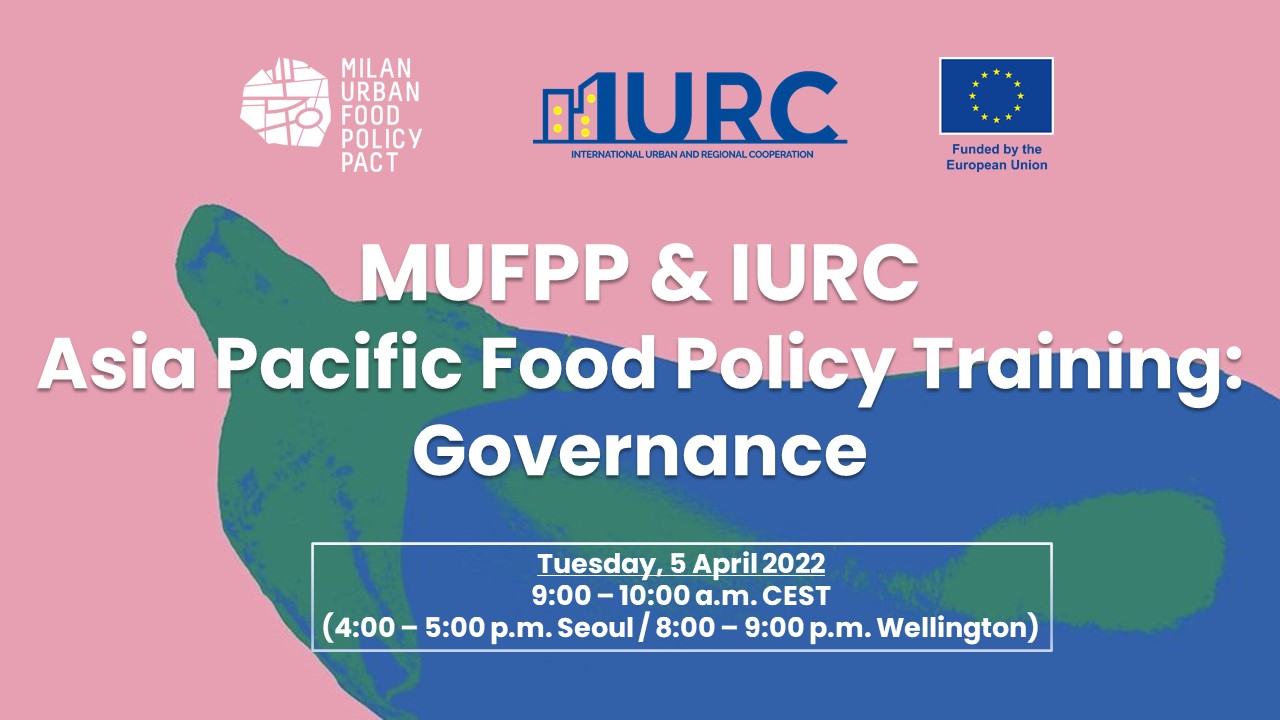Following the introductory webinar of the Asia Pacific Food Policy Training organised in March, IURC and the Milan Urban Food Policy Pact (MUFPP) hosted the first webinar dedicated to the governance of food systems on 05 April. The event facilitated an exchange of experience and best practices that cities have in consolidating their political and technical commitment to the food system. Moderating the webinar was Pablo Gandara, Team Leader of IURC Asia & Australasia.
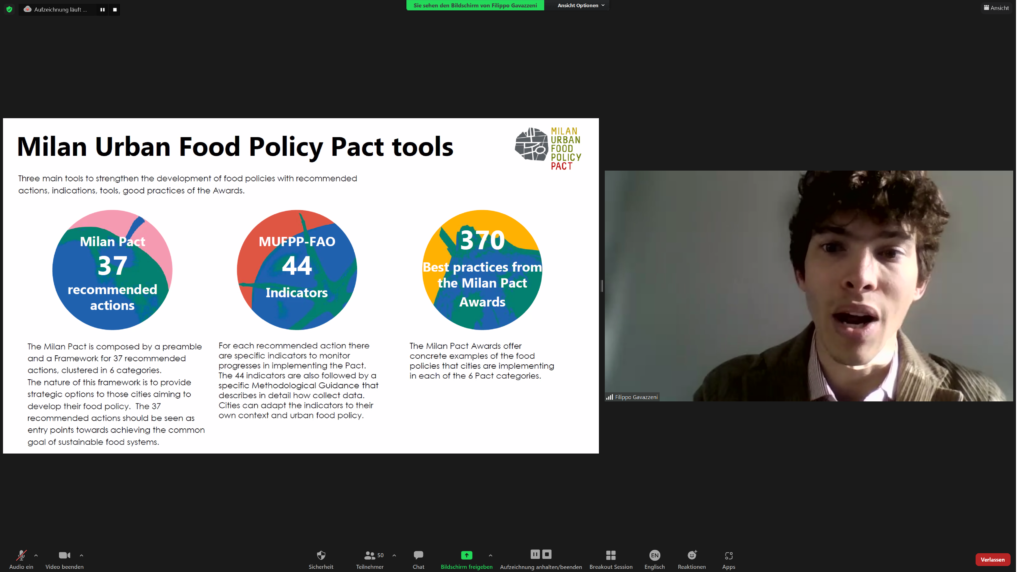
Filippo Gavazzeni, Head of the MUFPP Secretariat, introduced the MUFPP’s three main tools to strengthen the development of food policies: i) 36 recommended actions clustered in 6 categories, ii) 44 indicators to monitor progress implementing the Pact, and iii) 370 best practices from the Milan Pact Awards. Under the Governance category, six recommended actions were defined by MUFPP along with six specific indicators. The recommended actions are i) facilitating collaboration across city agencies and governments, ii) enhancing stakeholder participation, iii) identifying and evaluating local food initiatives, iv) developing urban food policies and plans, v) developing or improving a multi-sectoral information system, and vi) developing a disaster risk reduction strategy. To facilitate the use of indicators, a set of methodological guidelines has been developed, containing information on the types of data required, the data collection method, the resources needed, etc. The guidelines of six Governance Indicators are available here. A list of governance practices was also presented, collected through the Milan Pact Awards. Further, Filippo proudly announced the 6th edition of the Milan Pact Awards, which opens for all signatory cities that want to showcase their best practices.
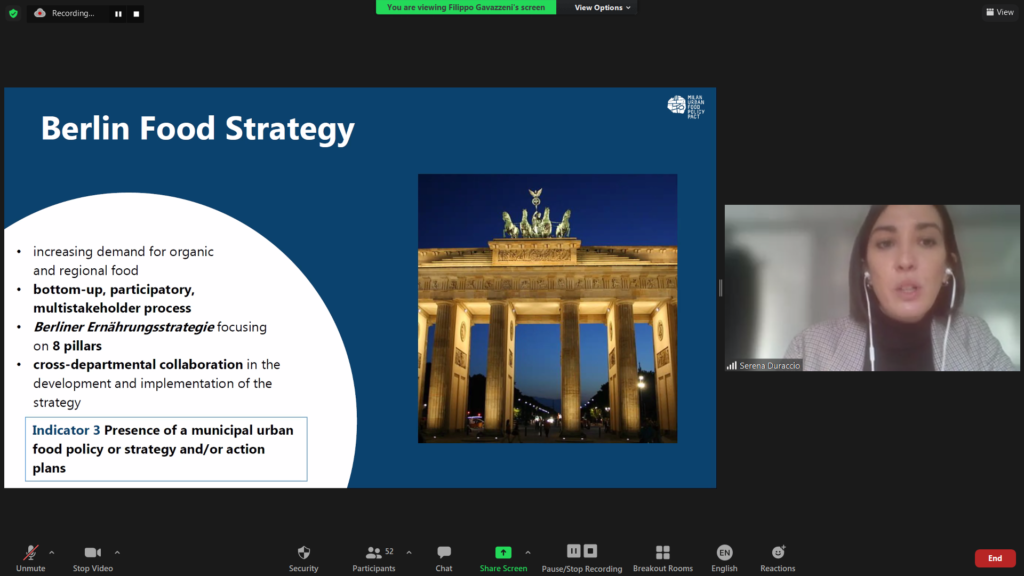
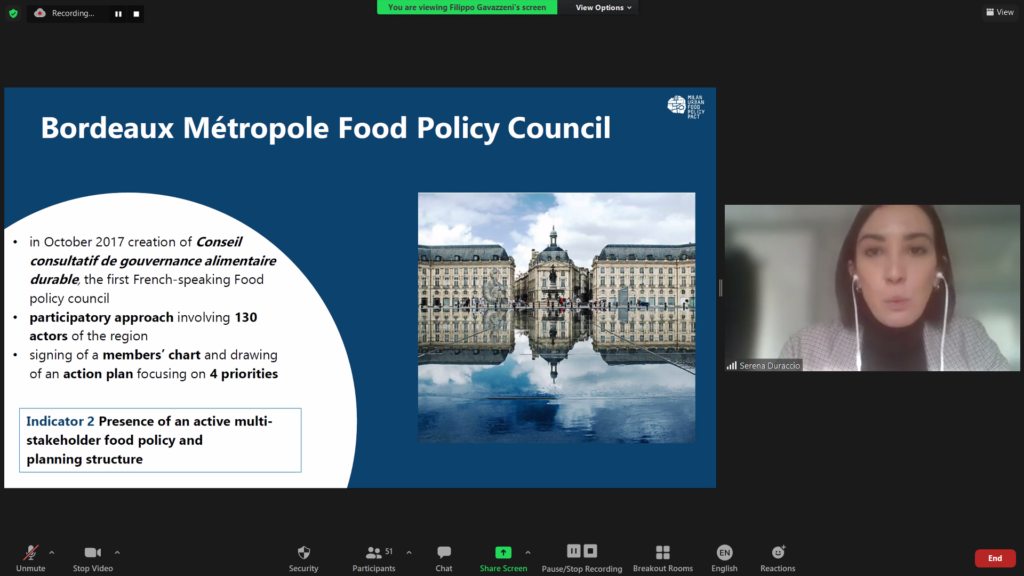
Serena Duraccio, an officer at the MUFPP Secretariat, provided examples of food governance from two European cities: Bordeaux and Berlin. Bordeaux established the Sustainable Food Governance Advisory Board in 2017, composing 130 actors from the regions. The Board aimed to promote synergies among different actors and promote new initiatives. Following the launch of the Board, an action plan was created, which focused on four priorities. The key aspect of Bordeaux’s strategy was the participatory process. They relied on Indicator 2, where they involved different actors from the very beginning of the process. Meanwhile, due to an increasing demand for organic and regional food, Berlin City created a Food Strategy in 2018. The development process of the Food Strategy involved multistakeholder from different policy areas, which successfully made Berlin the first German city to adopt an urban food strategy, achieving Indicator 3.
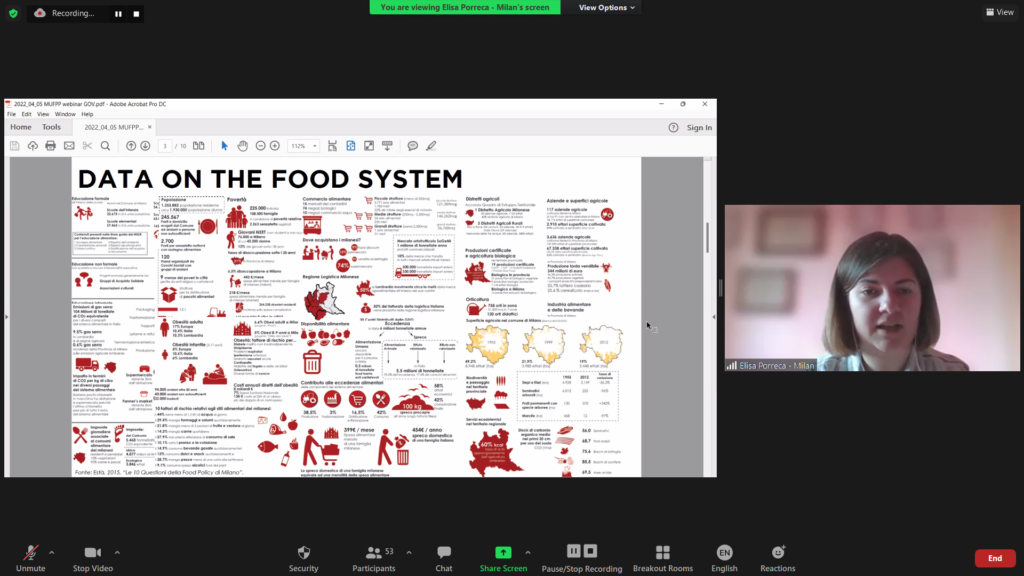
Elisa Porreca, Milan’s Food Policy Officer, shared her city’ experience with food system governance. The process started in 2014 when the first approach was to study and gather all the available information about Milan’s food system. The next process was public consultations with a wide range of stakeholders, including the city council. Those overall processes delivered the approval of a dedicated Food Policy in 2015, containing five priorities: i) ensuring healthy food for all, ii) promoting sustainability in the food system, iii) food education, iv) fighting food waste, and v) promoting scientific research. Elisa highlighted two key elements in the way Milan is governing its food system. The first element is the political commitment of a vice mayor in charge of food policy, which ensures the cross-cutting approach to all departments of the city. The second is a dedicated technical structure that coordinates the actors, initiatives, and actions within the city. Taking advantage of MUFPP governance indicators and recommended actions, Milan keeps those tools as another reference to ensure it is going in the right direction. Another best practice that Milan City has is an internal inventory of local initiatives managed both by the municipality and different stakeholders.
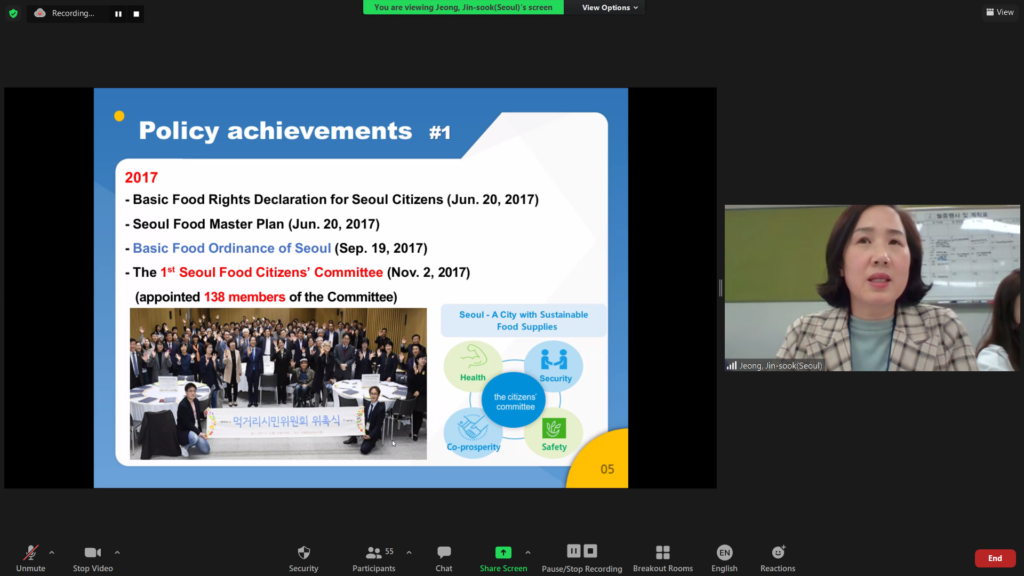
Jin-Sook Jeong, Director of the Food Policy Division of the Seoul Metropolitan Government, introduced the innovative and inclusive governance of the Seoul Food Policy. Since 2017, Seoul has been actively collaborating with the community in terms of monitoring policy establishment and supporting various projects. Jeong explained Seoul’s food policy achievements between 2017 and 2021. The first step was the establishment of the Seoul Food Citizen’s Committee, consisting of city officials, academia, experts, the community, small enterprises, a retail organisation, etc. The Committee was organized through seven subcommittees representing different political areas, namely i) public meal service, ii) urban agriculture, iii) food safety, iv) food ecology and co-prosperity, v) food health and security, vi) food community, and vii) food culture, education, and promotion. Seoul joined MUFPP in 2018 and has been selected as a Steering Committee meber in Asia Pacific Region until 2023. In 2019, Seoul issued the Food Strategy 2030 with six major values: health, security, co-prosperity, community, ecology, and happiness. The huge milestone was the 5-Year Basic Food Plan that was successfully developed in 2021. Further, Jeong remarked on the new and expanded Seoul Food Plan, including three elements. The first was responding to social, environmental, and climate change. Next, it reinforced proactive actions using cutting-edge information technology. And the final one was to realise the fundamental food rights of Seoul citizens.
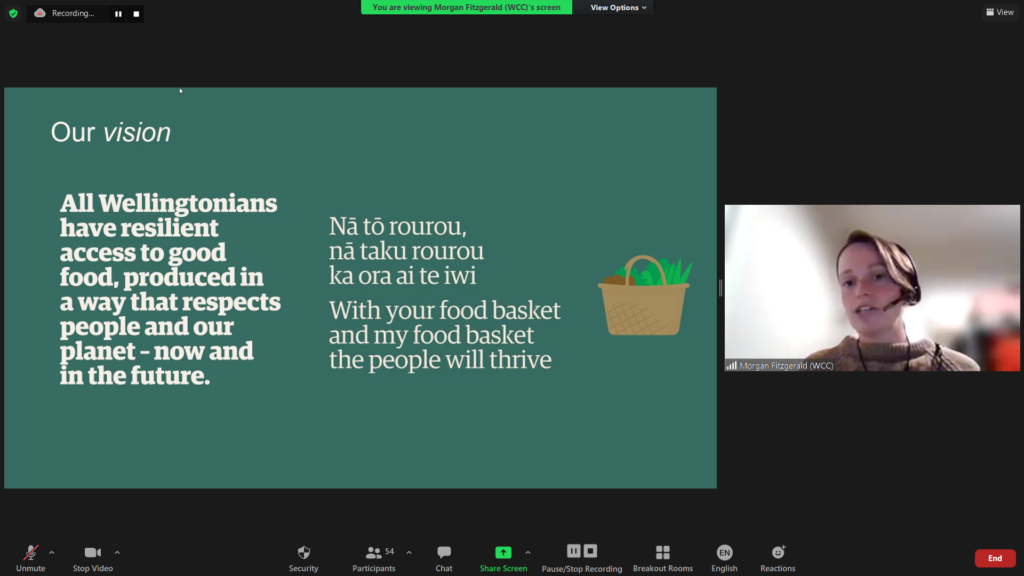
Morgan Fitzgerald, Resilience Advisor, City of Wellington, presented the Wellington City Council’s Action Plan for creating a sustainable, equitable and resilient food system. Becoming an MUFPP signatory city in 2021, Wellington relied on four documents that have been the foundation for the governance of its food system. The first document was Wellington Resilient Strategy, which is about the city’s resilience in the future. The second document serves as a climate change policy and the mission towards zero carbon. As the third document, the Social Wellbeing Framework outlines how the city empowers the communities. And the final document that will be released soon is the Economic Wellbeing Strategy. Speaking about the Action Plan, it is a document that examines all parts of the food system and actions one can take to improve it. The Action Plan focuses on five areas and takes an integrated, coordinated approach. Morgan also said that the priorities in the Action Plan were decided through the city council and community services, gaps analysis, and community engagement. In the final slide, she remarked on the lessons learned about the process of the food system. Among them was to find the local champion who would elevate the work through beyond an organisation to the whole city.
At the end of the session, there were questions and answers among the participants that made the training more attractive. The MUFPP Secretariat announced that the second webinar on sustainable diets and nutrition would be organised on 10 May 2022.
Presentations
- Asia Pacific Food Policy Training 1: Governance
- Milan Food Policy – Governance of the Food Systems
- Innovative and Inclusive Governance of the Seoul Food Policy
- Action Plan for Creating a Sustainable, Equitable, and Resilient Food System in Wellington City
